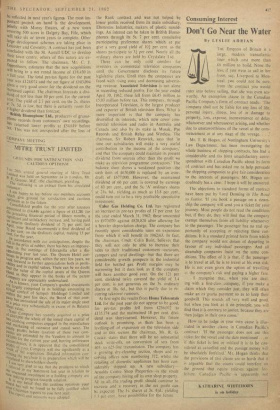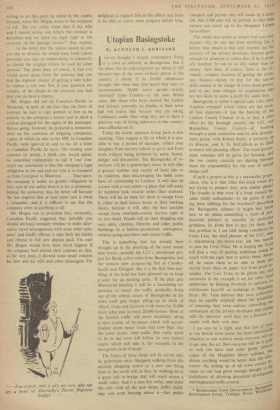Consuming Interest
Don't Go Near the Water
By LESLIE ADRIAN l tic Empress of Britain is a large, modern transatlantic liner which cost more than £6 million to build. None the less, if you were to sail in her from, say, Liverpool to Mon- treal. you could not be sure, from the contract you would enter into before sailing, that she was even sea- worthy. An exemption clause in the Canadian Pacific Company's form of contract reads: 'The company shall not be liable for any loss of life. personal injury. illness, loss of or damage to property, loss, expense. inconvenience or delay whatsoever and wheresoever arising, and whether due to unseaworthiness of the vessel at the com- mencement or at any stage of the voyage. .
Mr. T. B. Hogan, of Nottingham University's Law Department, has been investigating the whole business of shipping contracts, has had a considerable and (to him) unsatisfactory corre- spondence with Canadian Pacific about its form of contract and has asked me to help persuade the shipping companies to give fair consideration to the interests of passengers. Mr. Hogan un- doubtedly has a case: I hope it will be answered.
The objections to standard forms of contract have been put by Lord Denning in The Road to Justice. 'If you book a passage on a steam- ship the company will send you a ticket for your journey. Most people do not read the conditions but, if they do, they will find that the company exempt themselves from all liability whatsoever to the passenger. The passenger has no real op- portunity of accepting or rejecting these con- ditions. It is a standard printed form from which the company would not dream of departing in favour of any individual passenger. And all steamship companies insist on the same con- ditions. The effect of it is that, if the passenger is to travel at all, he is to travel at his own risk. He is not even given the option of travelling at the company's risk and paying a higher fare.
. I recognise that, when you are . ing with a first-class company, if you make a claim which they consider just, they will often make an ex gratia payment so as to keep their goodwill. This sounds all very well and good. but when you look at it on principle, you will find that it is contrary to justice, because they are then judges in their own cause.'
How to be judge in your own cause is illus- trated in another clause in Canadian Pacific's contract: 'If the passenger does not use this ticket for the vessel and the date mentioned ... or if this ticket is lost or mislaid it is to be con- sidered as cancelled and the passage money will be absolutely forfeited.' Mr. Hogan thinks that the provisions of this clause are so harsh that it is arguable that the courts could interfere on the ground that equity relieves against for- feiture. Canadian Pacific is apparently not
KATHARINE WHITE HORN is on holiday willing to let this point be tested in the courts, because, when Mr. Hogan wrote to the company to ask, 'Do you really mean that if my wife and I should mislay our tickets the contract is cancelled and we have no legal right to the recovery of the passage money?' they replied, „ . in the event that the tickets issued to you are lost or mislaid, we would issue fresh tickets provided you sign an undertaking to indemnify us should the original tickets be used by other persons.' The point here, of course, is that you would never guess from the contract that you had the slightest chance of getting a new ticket to replace a lost one. Yet, if you question the validity of the clause in the contract you find that you do have a chance.
Mr. Hogan did sail by Canadian Pacific to Montreal, in spite of the fact that the form of contract he had to sign seemed to him to be entirely in the company's favour and to show a cynical disregard for the rights of the passenger. Before going, however, he prepared a memoran- dum on the contracts of shipping companies, copies of which he sent to his MP, to Canadian Pacific (who ignored it) and to me. In a letter to Canadian Pacific he says: 'On reading your contract (it would, I think you would admit, be somewhat euphemistic to call it 'our' con- tract) my conclusion is that the company's legal obligation to me and and my wife is to transport us from Liverpool to Montreal. . . . That apart, the company is under no greater obligation to take care of our safety than it is for a stowaway. Indeed the stowaway may be better off because the law requires that at least some care is owed a trespasser, and it is difficult to see that the company owes us anything at all.'
Mr. Hogan was so persistent that, eventually, Canadian Pacific suggested that 'possibly you should seriously consider whether to make alter- native travel arrangements with some other com- pany' and kindly offered to take back his tickets and refund in full any deposit paid. I'm sure Mr. Hogan would have been much happier if the company had altered their contract so that, at the very least, it showed some small concern for him and his wife and other passengers. I'm '—Ten o'clock, and, if all's not well, why not try a bowl of Abernathy's Patent Digestive Toddy? . . delighted to support him in his efforts and hope tc be able to report some progress before long.











































 Previous page
Previous page